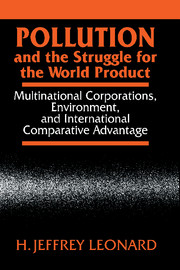 Pollution and the Struggle for the World Product
Pollution and the Struggle for the World Product Book contents
- Frontmatter
- Contents
- List of tables
- Preface
- Introduction
- 1 The dynamics of international trade and industrial location
- 2 Industrial-development strategy and the role of multinational corporations
- 3 Pollution and comparative advantage in industrial production
- 4 Environmental regulations and the industrial-flight hypothesis
- 5 Pollution and industrial strategy in four rapidly industrializing countries
- 6 Bargaining for the right to pollute
- 7 The politics of pollution and multinational corporations in rapidly industrializing countries
- 8 Theoretical implications and policy recommendations
- Index
5 - Pollution and industrial strategy in four rapidly industrializing countries
Published online by Cambridge University Press: 05 January 2012
- Frontmatter
- Contents
- List of tables
- Preface
- Introduction
- 1 The dynamics of international trade and industrial location
- 2 Industrial-development strategy and the role of multinational corporations
- 3 Pollution and comparative advantage in industrial production
- 4 Environmental regulations and the industrial-flight hypothesis
- 5 Pollution and industrial strategy in four rapidly industrializing countries
- 6 Bargaining for the right to pollute
- 7 The politics of pollution and multinational corporations in rapidly industrializing countries
- 8 Theoretical implications and policy recommendations
- Index
Summary
The examination of international industrial-location trends presented in the last chapter leads to the conclusion that the environment probably has not been and will not become an important factor in determining the distribution of overall international comparative advantage in industrial production, even in the industrial sectors most profoundly affected by stringent environmental controls. There is no evidence that the industrial-flight hypothesis is valid in any but a very narrow range of industries, nor does it appear that the world is being divided into core countries that export industrial polluters and peripheral countries that accept these rejected industries.
Still, the general lack of evidence to support the industrial-flight hypothesis does not necessarily mean that its twin, the pollution-haven hypothesis, is also invalid. The fact that environmental regulations have not driven industries from the United States does not mean that U.S. firms locating abroad have not sought to take advantage of lower environmental standards in some countries and have not contributed to pollution problems arising in countries where they do locate. Nor does it mean that industrializing countries have not operated on the assumption that their overall industrial development will be enhanced by maintenance of lax environmental standards for incoming industries.
This chapter, therefore, evaluates the pollution-haven hypothesis by looking at the extent to which environment has become an important factor in the industrial development of countries outside the United States, Japan, and the most advanced industrial nations of Europe.
- Type
- Chapter
- Information
- Pollution and the Struggle for the World ProductMultinational Corporations, Environment, and International Comparative Advantage, pp. 117 - 155Publisher: Cambridge University PressPrint publication year: 1988
